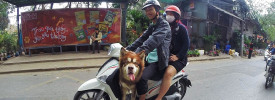Korea: Not Exactly What I Had Hoped For Past Review
By A student (Philosophy., Brandeis University) - abroad from 08/21/2014 to 06/13/2014 with
ISA Study Abroad in Seoul, South Korea
What did you gain/learn from your experience abroad? Was it worthwhile?
The most important thing that I learned was that the majority of people are, in one way or another, ignorant to how to treat someone unfaimilar to them as a human being rather than a spectacle, fetish, or means to their own personal gain.
Personal Information
| How much international exposure did you have prior to this program? | 2 weeks - 1 month |
Review Your Program
|
* Overall educational experience
Academic rigor, intensity, resources, etc. |
|
|
* Host Country Program Administration
On-site administration of your program |
|
|
* Housing:
How satisfied were you with your living arrangements? |
|
| * Food: |
|
|
* Social & Cultural Integration:
How integrated did you feel with the local culture? |
|
|
* Health Care:
How well were health issues addressed during the program? |
|
| * Safety: |
|
| If you could do it all over again would you choose the same program? |
Yes
|
Finances
|
* Money: How easily were you able to live on a student's budget?
(1 = not very easy/$200+ on food & personal expenses/week, 2.5 = $100/week, 5 = very easily/minimal cost) |
|
| Not including program expenses, about how much money did you spend on food and other expenses each week? | about $40 |
| Do you have any general money-saving tips for future study abroad participants? | Eating out is incredibly common in Korea and while it's completely worth experiencing as much variety as you can and is often necessary in social engagements, it can add up very quickly. Typically meals aren't nearly as expensive as they are at US restaurants, but even $3.50 kimbap rolls can add up if you eat them every day. |
Language
| * Did your program have a foreign language component? | Yes |
|
How much did the program encourage you to use the language?
0 = No encouragement, 5 = frequent encouragement to use the language |
|
| How would you rate your language skills at the beginning of the program? | Intermediate |
| How would you rate your language skills at the end of the program? | Intermediate |
| What was the highest level language course you had completed prior to departure? | Accelerated Korean |
| How many hours per day did you use the language? | |
| Do you have any tips/advice on the best ways to practice the language for future study abroad participants? | Make friends with Koreans -- they're often eager to practice English but shy to go up to you first. Alternatively, there are also Koreans who will use you exclusively to practice English. If you don't mind it and/or it's mutually beneficial, that's fine, but be adamant if you feel like your time is being wasted or if they're more interested in you for their own English language skills. This also extends somewhat to salespeople and cashiers; many will default to English if you don't look East Asian to them, so if you want to practice your Korean skills (which I recommend, as being able to communicate in Korean is more necessary for your health and safety than someone else's English practice when it's not Korea's first language), just keep speaking Korean. It's not off-putting for them and in my experience, Korean people were almost invariably put at ease when they didn't have to (in many cases) grapple with English. However, it's also your job to make a judgment on whether it's an appropriate time to take your time speaking: struggling to explain what you need with a long line of people behind you (in the case that the service person's English is more advanced than your Korean, which it well may be considering they probably have more vocabulary for the particular context, though many people downplay this to be humble) is probably not the best time to practice, and is disrespectful to other people's time. Also, from my experience at two different Korean universities, the language classes offered are minimally helpful. You're much, MUCH better off practicing informally with a native speaker and watching Korean TV, translating street signs, etc. to learn vocabulary and grammar you'll actually use. |
Other Program Information
|
* Where did you live?
Select all that apply |
|
|
* Who did you live with?
Select all that apply |
|
|
* Who did you take classes with?
Select all that apply |
|
| About how many local friends did you make that you will likely keep in touch with? |
A Look Back
| * What did you like most about the program? |
|
| * What could be improved? |
|
| * What do you know now that you wish you knew before going on this program? | That there are incredibly many ways to demean someone because of their gender and race, and how to deal with them. |
Reasons For Studying Abroad
| To help future students find programs attended by like-minded individuals, please choose the profile that most closely represents you. |
The Academic or LinguistYou went abroad with specific academic goals in mind; the program credentials and rigor of your coursework abroad were very important to you. You had a great time abroad, but never lost sight of your studies and (if applicable) were diligent with your foreign language study. Good for you! |
Featured Program Providers








